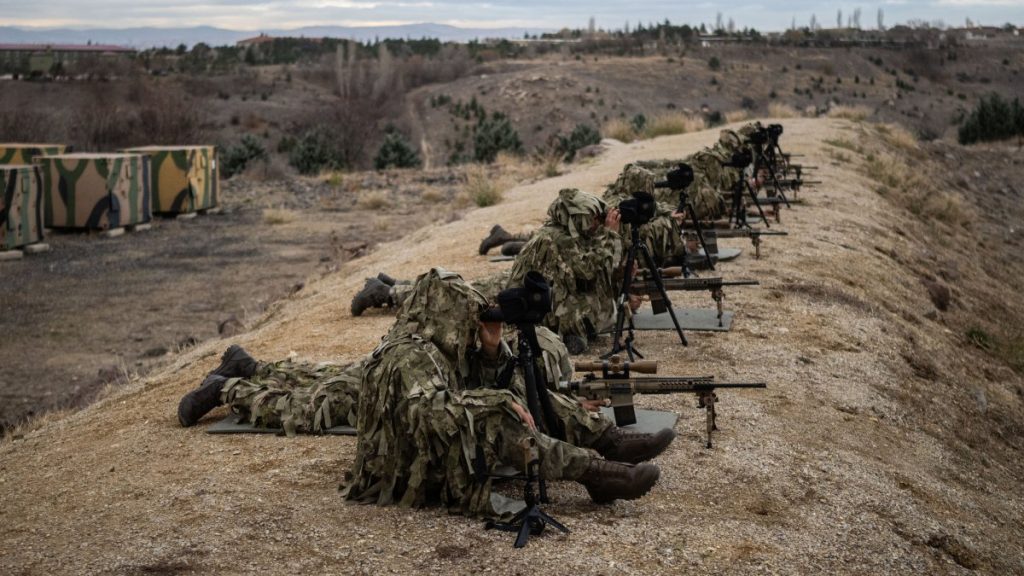The Ministry of National Defense released yearly statistics regarding counterterrorism in 2024. Türkiye this year has dealt a “major blow” to the terrorist groups PKK, its Syrian branches the PKK/PYD/YPG, as well as Daesh, particularly in northern Iraq and Syria, eliminating 3,038 terrorists since the beginning of 2024, the Ministry said Saturday.
As part of these counterterrorism efforts, “3,038 terrorists were (eliminated), 1,330 caves/shelters were destroyed and 2,450 weapons and more than 910,000 pieces of ammunition were seized,” the Ministry said on social media. It added that 107 terrorists surrendered during the course of the year.
The Turkish Armed Forces (TSK) is continuing its operations with “unconventional, unpredictable, swift and continuous” execution principles, following a strategy to eliminate terrorism at its source, it said. Türkiye’s efforts to completely remove terrorism continue with “great determination,” the Ministry stressed.
In its 40-year terror campaign against Türkiye, the PKK – listed as a terrorist organization by Türkiye, the United States and the European Union – has been responsible for the deaths of over 40,000 people, including women, children, infants and the elderly. The YPG, which also uses the name PYD, is its Syrian offshoot. Along with Daesh, it is one of two major threats to Türkiye in terms of terror attacks.
Strikes on the terrorist group have only intensified in the past two years. The PKK mounted an attack in the capital, Ankara, in October, as two of its members attempted to raid the headquarters of the Turkish Aerospace Industries (TAI), killing five and injuring 22 others.
President Recep Tayyip Erdoğan in November hinted at a large-scale military offensive in Syria against the PKK. One month later, the Assad regime was toppled and Syrian opposition forces moved to clear areas held by YPG in Syria from terrorists. It is unclear whether Türkiye will relaunch a cross-border offensive in the area as the Syrian National Army (SNA) captured Tal Rifaat and Manbij, two key bastions of the terrorist group. YPG, however, still retains Ain al-Arab and other towns in northeastern Syria while its leadership in an area it declared a so-called autonomy remains intact.
Cross-border operations are always in the cards for the country’s security, Erdoğan said in November, expressing readiness to launch them anytime the country feels threatened. Türkiye has launched several cross-border operations in recent years in both northern Syria and northern Iraq, targeting terrorists who hide out there and destabilize the border or plot attacks on Turkish soil.
Ankara has launched a trio of successful counterterrorism operations since 2016 to prevent the formation of a terror corridor and enable the peaceful settlement of residents: Euphrates Shield (2016), Olive Branch (2018) and Peace Spring (2019).
Security forces regularly conduct counterterrorism operations across the country, focusing on the eastern and southeastern provinces, where the PKK has attempted to establish a stronghold in its four-decade campaign of terror. Terrorists from the PKK and its branches, such as its Syrian wing, the YPG and Daesh, rely on a network of members and supporters in Türkiye.
But increasing operations in recent years have driven the PKK’s domestic presence to near extinction and the terrorist group has moved a large chunk of its operation to northern Iraq, including a stronghold in the Qandil Mountains, which sits roughly 40 kilometers (25 miles) southeast of the Turkish border in Irbil.
Türkiye has, over the past 25 years, operated several dozen military bases in northern Iraq in its war against the PKK and has been conducting airstrikes as part of “Claw” operations since 2022 to demolish terrorist lairs and prevent the formation of a terror corridor along its borders to both Iraq and Syria.
Defense Minister Yaşar Güler said recently that the ongoing Operation Claw-Lock, launched in April 2022, would be completed before the winter to sever the ties between Syria and Qandil.
The aim is to wipe out the PKK from the immediate Turkish borders and create an approximately 40-kilometer-deep security corridor along the Iraqi and Syrian borders.


